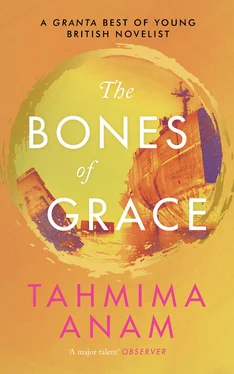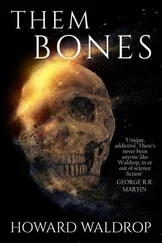‘He called me “brother”.’
I wanted to tell him that I knew the feeling exactly, the feeling of being at the centre of your world, that your hunger seemed insatiable and particular, that I too was in its thrall, and also afraid of where it would lead me.
Mo was crying openly now, and I went back to my eggplant to give him a moment of privacy. He leaned forward on the stone, pulverising one onion after another. Then he scooped everything into a bowl and lit the stove, working quickly, not bothering to wipe his face.
I wondered what I might offer Mo at this moment, something to make up for having taken away his trip to America. ‘Do you know reading, Mo?’ I asked. He stopped stirring and turned around to face me.
‘No.’
‘You never went to school?’
‘No schools around here.’
‘I’ll teach you,’ I said. ‘We’ll start tonight.’
He started to cry again. I felt the urge to hug him, but I sensed for some reason that this would not be what he wanted, so I just kept my eyes on him as he finished the cooking and put the curries into bowls and set the table.
The food was very spicy and I could hardly eat it, but you didn’t seem to notice, crowding the dishes onto your plate. I wasn’t hungry anyway. Mo came around and poured water into our glasses. When you thanked him, he slipped into the kitchen without replying. ‘Is there something wrong with Mo?’ you asked.
‘He thought you were taking him to America.’
‘Really? Oh.’ You were getting good at eating with your fingers, mixing, as I had instructed you, each dish with a little rice.
‘What did you say to him?’
‘Nothing. I mean, nothing intentional. But maybe I should’ve been more careful.’ You licked the tips of your fingers. ‘I could, you know.’
‘You could what?’
‘I could take him with me.’
It was just like an American. You had probably never lined up outside an embassy, wondering whether your visa application would be rejected, never listened to your friends plotting the various ways they could get out of the country for good, never had that sinking feeling in the pit of your stomach when you produced your green leather passport to an immigration official at a foreign airport.
‘You’d have to adopt him or something.’
‘I know.’
I took a long sip of water. ‘No, you don’t. You don’t know anything.’
You looked down at your empty plate. ‘If you’re trying to tell me I’m ignorant about what it’s like to come from here, you’re right. But don’t doubt my intentions.’
‘You make everything sound so easy when it’s not.’
‘Sometimes we think things are difficult — impossible — but we just have to do them.’
Of course you were talking about me. But how could you know whether it would be easy or hard when no one had ever had any expectations of you, when your parents didn’t mind if you dropped out of graduate school or never had a career or married some strange girl you met at a concert? ‘You don’t know anything about me,’ I said. ‘Not the first thing.’
‘You have more will than you give yourself credit for.’
‘Because I’m a little orphan girl who made her way into the light?’ And this, of course, was my way of telling you what I was really afraid of — not the disapprobation of Rashid or Dolly or Bulbul, but that I would lose my parents, the family I had neither earned nor deserved, everything, really, that my life was based on. But I didn’t say this out loud, I just assumed you knew, and later when there came to be nothing but a thick silence between us, I wished I had made myself clearer. I wished I had told you that I had lived my life in fear that they would somehow take me back to where I was from, return me, that though I’d been loved and cherished by them my whole life, I had never been able to surrender the suspicion that they might, someday, change their minds.
I found you awake in the middle of the night. ‘I can’t sleep,’ you said. ‘You married him. Why did you do that?’
‘Rashid and I were practically married anyway.’
The moon was behind you and I saw the outline of your face but not the expression on it. ‘Fuck you.’
I had never heard you say that word in an angry way, only a loving one.
‘I had a whole life before you, Elijah.’
‘You broke my heart. Back there in Cambridge. I won’t let you do it again.’
‘How am I doing it now?’
‘I shouldn’t have come,’ you said. ‘And we should never have taken it this far.
My instinct was to argue that I hadn’t cheated on you; we had never promised each other anything: my engagement to Rashid pre-dated whatever it was that had happened between us, and that if anyone had a right to accuse me of betrayal, it was him. But that wouldn’t have been entirely honest of me. Of course we had made promises. That day together in Cambridge, walking along Mass Ave, the Glass Flowers, your grandmother’s funeral — it was all one long preamble to a pact. That was why I had vowed to remake myself in Dera Bugti, why I had waited with my heart in my stomach for every message you sent me, why I had taken it so badly when Zamzam was arrested and the dig was cancelled. It was because I knew, from the first note the pianist played after the intermission, that you would become the promise that overcame all my other commitments. I had cheated on you by getting married, and now I had to break everything apart in order to remedy that. I threw my arms around you and buried my head in your neck, your piney scent still lingering on your skin though it was tamped down by the sea, the damp heat of early summer, and I repeated, again and again, how sorry I was to you, meaning also that I was sorry to myself, to the whole enterprise of our togetherness. But there was only one thing I could say that would make it right. ‘I’ll do it,’ I said. ‘I’ll tell him. As soon as he’s back from China, I’ll tell him everything.’
Some part of you didn’t believe me, I know that, but the rest of you wanted to so badly that you accepted my promise and allowed yourself to return my embrace, and for that moment, we were fully together, neither one of us the guilty, neither one of us the wounded.
You will, of course, have remembered all of this yourself. But I write it to you now so that you know that it is burned onto my memory, every moment, every word of it. And if, by chance, your regard for me has sunk so low that you have pushed all thoughts of me out of your mind, that you have forced yourself to forget, I am here to remind you. We were in love. We were real. There were witnesses, and I am one of them.
I am at Bettina’s house for Christmas. It’s a modest townhouse in Astoria with a tiny front lawn and neighbours who have known the family since they first moved in four decades ago. From the little guest-room on the top floor, I can smell the malty flavour of the turkey and the bacon that is draped across its breast. Bettina’s mother tells me I need to eat, and I am reassured by this echo of mother talk, the same words I hear from Ammoo and Bashonti when I am at home in Dhaka.
My father lived in New York once. He moved here after the war and drove a taxi and shared a room above a restaurant in Jackson Heights with a Bangladeshi man named Asif who told him never to take a fare above 116th Street. ‘Black people are all criminals,’ he said. My father had been in a war, and this made him unable to take such statements seriously. He soon befriended George, who also drove a cab and sometimes ordered eggs at the counter of the diner where my father picked up his morning coffee (an acquired taste, this, but one he had come to love). George had black and grey dreadlocks down to his waist and wore a tweed jacket with leather elbow patches. He lived in Flatbush, in a house he shared with a dozen or so other people. They had a dish rota and read aloud to one another every evening after dinner, which they cooked using vegetables they grew in the back garden. When my father visited, a young woman answered the door and said ‘Namaste’ with her hands folded, and my father was going to explain to her that in his part of South Asia they didn’t say ‘Namaste’ but ‘As-salaam walaikum’, but then he realised, when the doorbell rang again and she greeted another person, this time a young man in a beard, that she used this word to greet anyone, not just someone who looked like he knew what it meant, and he couldn’t decide whether this lack of specificity was good or bad. Later, he read a few stanzas of Nazrul’s Bidrohi to the assembled group, which included an assortment of people who could be loosely classified as hippies.
Читать дальше












